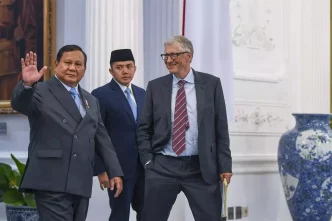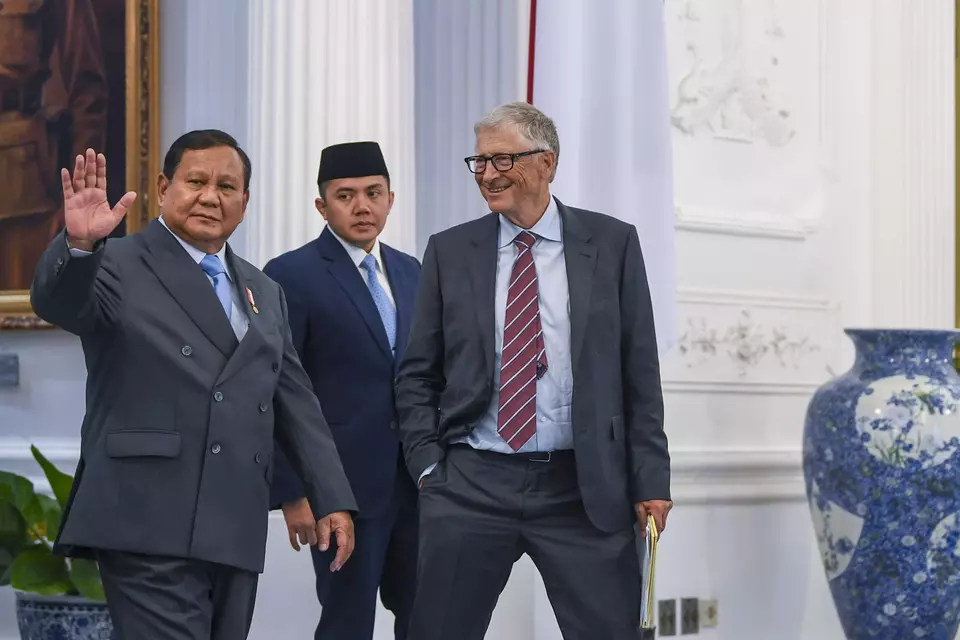By Jaxon Holt, South East Asia Correspondent
Indonesia has invited Microsoft co-founder Bill Gates to join the advisory board of Danantara, its new sovereign wealth fund, aiming to position the nation as a philanthropy hub in ASEAN. During a visit to Jakarta on 7 May, President Prabowo Subianto proposed a partnership between the Gates Foundation and Danantara Trust, the fund’s charitable arm, starting with $100 million and targeting $1 billion in six years. Modeled on Singapore’s Temasek Foundation, the trust will fund education, healthcare, and sanitation, potentially unlocking $30 billion annually if philanthropy reaches 2% of Indonesia’s $1.5 trillion GDP. While the plan showcases ambition, funding constraints and governance risks pose challenges.
Gates, whose foundation has granted over $159 million to Indonesia since 2009, met Prabowo at Merdeka Palace to discuss health, nutrition, and development. He outlined plans for tuberculosis vaccine trials and anemia programs, critical for a nation losing 100,000 lives yearly to TB. The talks also highlighted Prabowo’s Free Nutritious Meals program, set to reach 82.9 million by year-end, which Gates called “impressive” for its scale. If successful, the collaboration could elevate Indonesia’s welfare model, though sustaining these initiatives will demand robust financing.
A Vision for Philanthropy
Danantara, launched in February 2025, manages $20 billion in state assets, with long-term goals of $900 billion. Its Trust Fund, funded by 1–2.5% of state-owned enterprise dividends, will align corporate social responsibility with national priorities like education and healthcare. Rosan Roeslani, Danantara’s CEO and Investment Minister, said the fund aims to reach $1 billion in five to six years. The Gates Foundation, managing a $75 billion endowment, has agreed in principle to co-finance, with details under negotiation.
Health Minister Budi Gunadi Sadikin urged Gates to join the advisory board, alongside hedge fund titan Ray Dalio and economist Jeffrey Sachs, citing their roles in China’s Global Philanthropy Institute. Budi estimated that matching developed nations’ 2% GDP philanthropy could yield $30 billion annually, but noted that a lack of trusted institutions pushes Indonesian giving overseas. If Gates’ involvement builds credibility, local philanthropists like Sukanto Tanoto, who signed a new MoU with Gates on 6 May, may redirect funds domestically.
The advisory board, announced in March, includes global figures like former Thai PM Thaksin Shinawatra and financial experts Helman Sitohang and Chapman Taylor. Their expertise aims to address concerns about political interference, given Danantara’s ties to state enterprises. Transparent governance could make the fund a regional benchmark, but any missteps risk deterring investors.
Health and AI Opportunities
Gates emphasized health initiatives, including a TB vaccine trial and micronutrient programs for 2026–2027, building on $300 million in grants since 2009, including polio vaccine support via Bio Farma. He also highlighted AI’s potential in diagnostics, education, and agriculture, such as improving crop yields. If adopted effectively, AI could accelerate Indonesia’s development, though rural infrastructure gaps pose hurdles.
The partnership extends to Prabowo’s meals program, costing $28 billion through 2029 and serving students and pregnant women. During a school visit in Jakarta, Gates praised its ambition, but critics question its affordability amid 4.87% GDP growth in 2024. If funding falters, the program may face cutbacks, risking public confidence.
Potential and Pitfalls
The Danantara-Gates collaboration could reshape Indonesia’s welfare landscape. The trust’s focus aligns with ASEAN’s 2025 goals, potentially drawing philanthropists like Chairul Tanjung, introduced to Gates alongside tycoons like Prajogo Pangestu. Capturing 2% of GDP in philanthropy could fund schools, clinics, and sanitation, reducing rural-urban disparities. Gates’ board role, if accepted, may signal trust, attracting global capital.
However, challenges are significant. Danantara’s $100 million startup capital relies on state enterprise dividends, scrutinized after 2024 audits exposed mismanagement. The meals program’s $28 billion cost competes with flood recovery and energy projects, straining budgets. Public sentiment on X is mixed: some praise the Gates meeting, while others highlight logistical issues with the meals program. If governance or funding weakens, the initiative may falter.
Regional and Political Stakes
Indonesia’s plan stands out in ASEAN, where Malaysia’s Khazanah fund prioritizes domestic firms and Singapore’s Temasek Foundation operates independently. Prabowo’s 8% growth target by 2029 depends on Danantara’s success, with 2026 elections looming. Gates’ potential civilian honor at the UN General Assembly in September 2025 underscores Indonesia’s global aspirations.
If the partnership thrives, Indonesia could lead ASEAN philanthropy, rivaling Singapore. Failure risks diverting funds abroad, as Budi warned. Gates noted that philanthropy can transform health and education if governments align priorities. As Prabowo balances growth and welfare, Danantara’s ability to build trust will shape its legacy.















